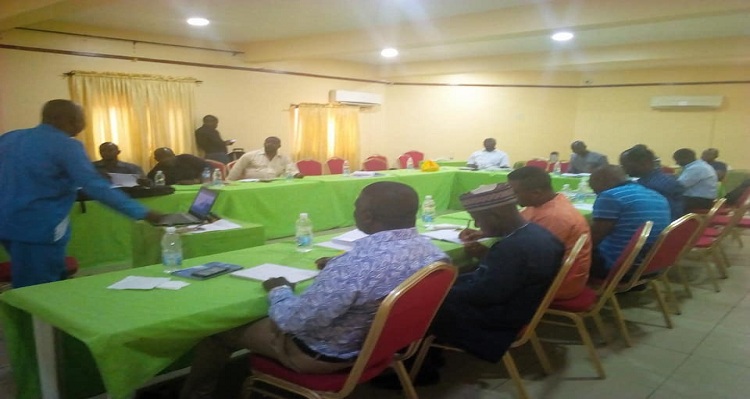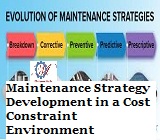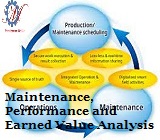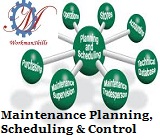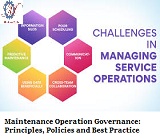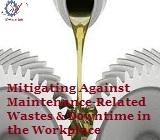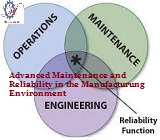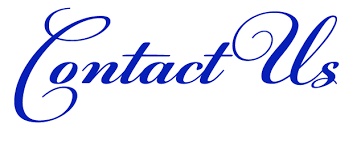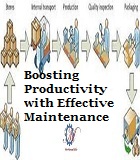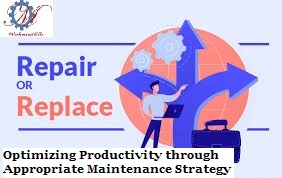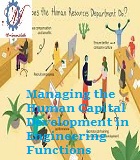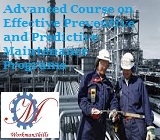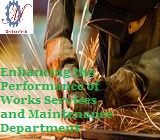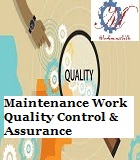An Intensive 2-Day Training Course
Maintenance Strategy Development and Cost Effective Implementation: Overcoming Reliability Challenges in a Cost Constraint Environment
Maintenance Strategy Development and Cost Effective Implementation: Overcoming Reliability Challenges in a Cost Constraint Environment
Tutor-Led Class @ NGN120,000.00 per Participant
Online @ NGN100,000.00 Per participant
On-Site to make formal request
Venue: Mechelectric Conference Centres, Ikeja, Abuja, PH and Ota
Date and Time: November 6 - 7, 2025; 0900Hr - 1600Hr Daily
Course Overview
In the competitive environment of today, availability and reliability of assets is more than ever an important issue. Maintainers are faced with the challenge to deliver the same levels of equipment safety, reliability and availability with smaller budgets. Therefore, maintenance & reliability best practices are critical for every organization who would like to be best in class. Apart from maintenance & reliability engineering, outsourcing maintenance activities to contractors could contribute to this significantly. Because sometimes external parties are better suited to improve the performance than you or you simply do not want to do it yourself.
This highly-interactive training course emphasizes the most effective strategies, policies, tactics and practices that are needed to ensure the reliability, integrity and durability of the physical assets through their life-cycle. This WorkmanSkills training course will ensure that you understand how to decide rationally what maintenance activities to outsource and what not, how to select the best maintenance contractor and how to evaluate the delivered performance of all parties involved. Maintenance contracts used in several branches will be discussed.
You will have the opportunity to discuss the best practices used in your organization. Through a combination of formal lectures and group work, you will leave the course with the tools to improve your processes and way of working.
The first module of this workshop delivers many practical and new Maintenance and Reliability Best Practices concepts and tools. You will discuss these concepts and practice using practical tools in case studies and discussion groups. The second module then helps you decide in a rational way which activities are best done with internal resources and which are best outsourced. Tools and techniques are introduced which will help you ensure that outsourcing contracts are comprehensive and avoid the common pitfalls.
The costs associated with equipment downtime and reduced production can be significant. Learning how to effectively manage all aspects of your industrial facility is a must - so is this 3 - day seminar.
The focuses of this training course are highlighted as follows:
Course Benefits:
By attending this WorkmanSkills training, delegates will be able to:
Target Audience:
How will this Training Course be Presented?
This WorkmanSkills course will be conducted along workshop principles with formal lectures and interactive examples, which will result in the active participation of all delegates in discussions and teamwork of problem solving. There will be several class-workshops during which case studies and real life problems will be solved in team work. This will provide understanding of the problems and illustrate the efficient application of modern maintenance optimization technologies. There will be ample opportunities for active, open discussions and sharing professional experiences on various industrial applications. All course materials will be provided.
Course Outlines
Module One: Equipment Life-cycle Cost Introduction
The Certificate
Certificate of Completion will be provided to delegates who attend and complete the course
In the competitive environment of today, availability and reliability of assets is more than ever an important issue. Maintainers are faced with the challenge to deliver the same levels of equipment safety, reliability and availability with smaller budgets. Therefore, maintenance & reliability best practices are critical for every organization who would like to be best in class. Apart from maintenance & reliability engineering, outsourcing maintenance activities to contractors could contribute to this significantly. Because sometimes external parties are better suited to improve the performance than you or you simply do not want to do it yourself.
This highly-interactive training course emphasizes the most effective strategies, policies, tactics and practices that are needed to ensure the reliability, integrity and durability of the physical assets through their life-cycle. This WorkmanSkills training course will ensure that you understand how to decide rationally what maintenance activities to outsource and what not, how to select the best maintenance contractor and how to evaluate the delivered performance of all parties involved. Maintenance contracts used in several branches will be discussed.
You will have the opportunity to discuss the best practices used in your organization. Through a combination of formal lectures and group work, you will leave the course with the tools to improve your processes and way of working.
The first module of this workshop delivers many practical and new Maintenance and Reliability Best Practices concepts and tools. You will discuss these concepts and practice using practical tools in case studies and discussion groups. The second module then helps you decide in a rational way which activities are best done with internal resources and which are best outsourced. Tools and techniques are introduced which will help you ensure that outsourcing contracts are comprehensive and avoid the common pitfalls.
The costs associated with equipment downtime and reduced production can be significant. Learning how to effectively manage all aspects of your industrial facility is a must - so is this 3 - day seminar.
The focuses of this training course are highlighted as follows:
- Financial concepts of costs, capital, profit and return on investment
- The model for asset healthcare
- Cost impact of equipment failure and degradation
- Proactive practices and tools to reduce maintenance costs
- Failure analysis to focus cost reduction efforts
- Work management to improve resource efficiency
- Understanding Outsourcing considerations
- Contracting types, incl. Service Level Agreements (SLA’s)
- Key Performance Indicators (KPI’s) to monitor performance
- Developing contracts – the contracting cycle
- Negotiating skills
- Continuous improvement and performance management: how to evaluate the performance with all parties involved.
Course Benefits:
By attending this WorkmanSkills training, delegates will be able to:
- Understand the concepts of costs, capital, profit and ROI
- Understand the cost impact of unanticipated failure
- Apply proactive policies to reduce future maintenance costs
- Structure and analyze failure data to reduce repetitive failures
- Identify root causes of unanticipated failure costs
- Reduce resource costs through efficient work management practices
- Decide rationally what maintenance activities to outsource and what not
- Use the features, functions and benefits of lean maintenance contracts
- Use the most applicable type of maintenance contracts (incl. Service Level Agreements) and when/how to apply them
- Define service levels and monitor the contractor performance
- Develop and negotiate a maintenance contract
- Recognize the pitfalls
- Evaluate the delivered performance of all parties involved
- Implement maintenance contract management
Target Audience:
- Planners
- Supervisors
- Engineers
- Reliability engineers
- Maintenance team leaders and managers
- Operations team leaders and managers
- All professionals involved in procurement and supply chain management
- All professionals negotiating, managing and verifying maintenance contracts
- Teams who have been assigned the responsibility of establishing a maintenance contract will find it extremely useful to attend this course as a unit
- Anyone who wishes to update themselves on Maintenance Contracts & Outsourcing
How will this Training Course be Presented?
This WorkmanSkills course will be conducted along workshop principles with formal lectures and interactive examples, which will result in the active participation of all delegates in discussions and teamwork of problem solving. There will be several class-workshops during which case studies and real life problems will be solved in team work. This will provide understanding of the problems and illustrate the efficient application of modern maintenance optimization technologies. There will be ample opportunities for active, open discussions and sharing professional experiences on various industrial applications. All course materials will be provided.
Course Outlines
Module One: Equipment Life-cycle Cost Introduction
- Definitions of reliability, maintenance & asset management
- The concept of costs, capital, profits and return on investment
- The ‘Asset Healthcare Model’
- Key areas of asset management
- Open discussion sessions
- The real cost of unanticipated failure
- Asset performance standards
- The forms of asset failure and degradation
- The causes and nature of asset failure and degradation
- The effects, cost and risks of asset degradation
- Practical application and discussion of case study
- Programmed maintenance
- Programmed maintenance intervals
- Condition-based maintenance intervals
- Implementing optimized PM programs
- Optimizing spares to support the maintenance program
- Practical application and discussion of case study
- Failure data collection and analysis
- The impact of chronic failures versus intermittent failures
- Focus improvement through Pareto analysis
- Quantify losses in life cycle terms
- Rigorous root cause analysis techniques
- Root cause analysis case study
- Discussion of software and templates to support analysis
- Work identification and defect reporting
- The importance of backlog
- Planning for quality and reliability
- Capacity planning
- Scheduling for efficiency
- Work logistics and preparation
- Checklists and practical aspects work quality control
- Final discussion and evaluation
- Introduction
- Asset management - The business impact of maintenance
- Considerations in outsourcing maintenance – what to outsource and what not?
- Activity on asset matrix
- Risks involved
- Outsourcing maintenance activities – case study
- Maintenance contract types
- Parties involved
- The tendering process – modern ways of tendering
- Choosing the right contractor
- Costing the service
- Defining Key Performance Indicators to monitor the performance of all parties involved
- Use of Balanced Scorecard with performance contracts
- Interactive exercise and examples
- Vendor management
- The contracting cycle
- Assemble a team
- Assess, determine and specify the required service levels
- Writing the contract – contents of a maintenance contract
- Interactive exercise: review some existing contracts
- Implementing contract management – how to make it work (performance management)
- Periodic evaluation & improvement
- Expectations about availability, reliability and costs
- The extensive preventive maintenance schedule – “tricks” of maintenance contractors
- The seven steps to develop a risk based maintenance concept
- Using the maintenance concept to negotiate more effectively lean maintenance contracts
- Negotiating the contract – negotiation ploys
- Negotiating the contract – negotiation tactics
- Negotiating tips
- Interactive exercise and role play regarding negotiating
- Development of a maintenance contract in groups
- Defining the requirements and service levels
- Develop the offer
- Selection criteria
- Presenting the bid
- Closing the contract
- Evaluation of results
- Wrap-up
The Certificate
Certificate of Completion will be provided to delegates who attend and complete the course



